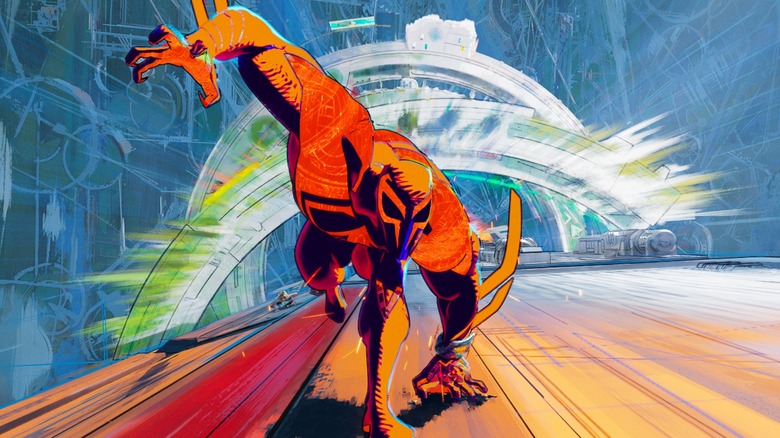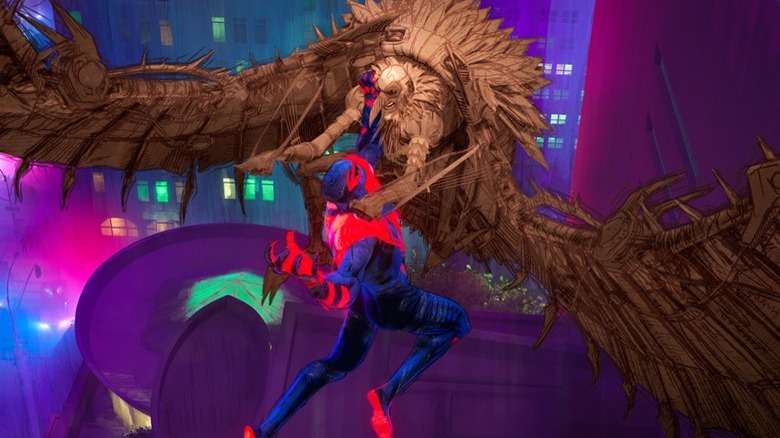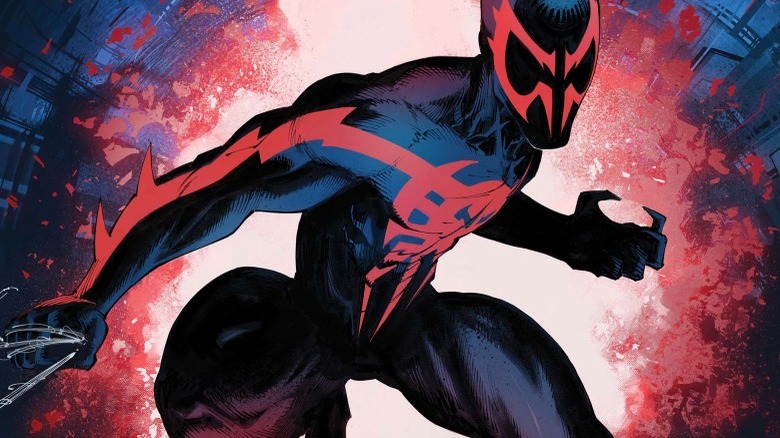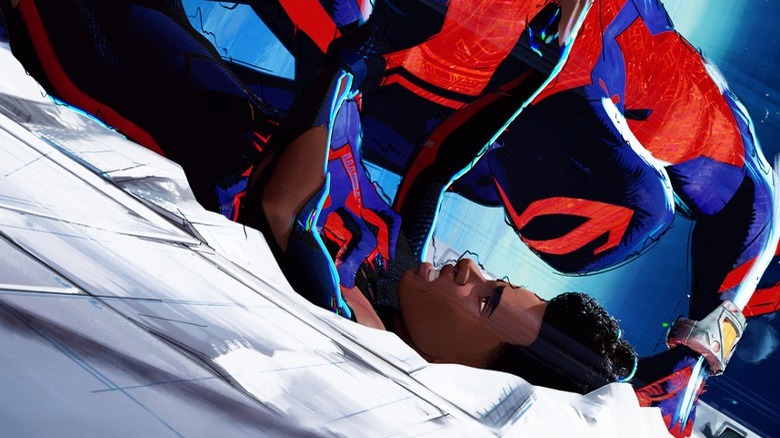Across The Spider-Verse's Spider-Man 2099 Is A Great Antagonist Because He Has A Point
This post contains spoilers for "Spider-Man: Across the Spider-Verse."
In "Spider-Man: Scross the Spider-Verse," it's a year after Miles Morales (Shameik Moore) destroyed the collider that helped stabilize the Multiverse, and he must embrace the responsibilities of becoming Brooklyn's only Spider-Man. The kid does so with unbelievable dedication and gusto — perhaps a bit too much because as he stretches himself thin while balancing his public and private personas, the weight of his double life is taking a swift toll on him. To complicate matters, a new villain emerges in the scene, harboring a vendetta against Miles for a string of unfortunate reasons, forcing Miles to once again step up to the demanding mantle of balancing great power with even greater responsibility.
However, this new big bad, known as The Spot, turns out to be the least of Miles' problems. When Gwen Stacy (Hailee Steinfeld) suddenly approaches him for a mission related to The Spot, Miles' world is turned upside-down: now, he must not only stop The Spot from destroying universes on a whim but also work in tandem with the Spider-Society, lead by the brooding, no-nonsense Miguel O' Hara, aka Spider-Man 2099 (Oscar Isaac). While Miguel and Miles, along with all the other Spider-People, share a common enemy, a schism is formed between the two as the story unfolds, making way for an emotional, ethical conflict that complicates matters greatly. With both parties firmly rooted in their worldviews, a clash of ideals seems inevitable, which will most likely inform the story of "Spider-Man: Beyond the Spider-Verse."
In the process, Miguel emerges as an anti-hero of sorts, as his motivations directly challenge Miles, who we've actively rooted for so far. What makes Miguel such a compelling antagonist, and how does this turn tint the future of the Spider-Verse?
The greater good
In one of the tensest confrontations in the film, Miguel informs Miles that his actions are creating anomalies across the Multiverse and destabilizing it. There is a heavy cost one must pay when they become a Spider-Person, as this new identity directly stems from losing a loved one, and brings forth more pain for those close to the respective Spider-People. For instance, every Peter Parker will lose Uncle Ben, and in the case of every Miles Morales, they are bound to lose their Uncle Aaron. Similarly, people linked to Spider-People will also die, including those with the rank of Captain, which implies that Miles' father is doomed to die in every universe.
Miguel categorizes these occurrences as canon events that stabilize the equilibrium of the Multiverse and emphasizes the need to not mess with the intended canon. There's good reason for Miguel to champion this ideology — he is not some misguided superhero who believes in a toxic vision of the greater good, but someone who has personally experienced the consequences of messing with canon events. Creating anomalies only invokes greater pain and destruction, and jeopardizes the lives of millions across the Multiverse. Accepting personal loss is the lesser evil, at least from Miguel's point of view.
Miles thoroughly rejects this. After all, how can anyone be okay with the foreknowledge that a loved one will die soon, and do nothing to stop it? Desperate to save his father, Miles escapes, as the Spider-Society chases him. While Miles' view is understandable, there is a reason why Miguel's motivations feel so compelling, despite the dark turn it takes down the line.
Spider-Man 2099 has gone through the wringer
While Miguel provides a valid explanation for his convictions in the film, understanding his comic counterpart might provide greater insight into the man he is today. Miguel O'Hara has never been the friendly, neighborhood Spider-Man — if anything, his transformation is rooted in greater personal tragedy, as his powers stem from forced DNA splicing as opposed to a bite from a radioactive spider. As a young man, Miguel was closely associated with Alchemax, the company The Spot worked for, and tortured with an addictive hallucinogenic drug called Rapture. To counteract these effects, Miguel had to undergo genetic mutation, which led him to inherit his powers, along with sharp fangs and talons, which earned him the moniker of "vampire."
Unlike most iterations of Spider-people, Miguel's transformation did not earn him any popularity. His mutation was seen as an abomination, and he lost several loved ones in the transitory process. Severe guilt and a need to right his wrongs drove Miguel to challenge Alchemax, along with anyone who sought to jeopardize structured order. This explains Miguel's gaunt, world-weary demeanor in "Across the Spider-Verse" — he is not just responsible for protecting one neighborhood, but the entire world, with several universes involved. Moreover, as his title suggests, Miguel is from the dystopian future, having seen the world on the brink of extinction, which makes him hyper-aware of the value that the present holds. Balance is everything for Miguel, and Miles' anomalous presence directly threatens everything he holds dear.
This, supplemented with the personal loss he underwent later, solidifies his reasonings as more nuanced, informed, and mature. Making peace with loss has become second nature for Miguel, and he expects everyone to do their part and conform to the canon. Can Miles Morales succeed in changing his mind?
Losing sight of what's important
What makes Miguel such an interesting antagonist is the fact that his intentions do not stem from ill will at all. On the contrary, he intends to maintain order and shoulder the terrible responsibility of keeping everything in order, no matter how ethically ambiguous the situation turns out to be. This is a potentially dangerous road, as it is easy for dogged determination to turn into misguided obsession, thinning the lines between what makes someone "good" or "bad." At one point, Miles even exclaims, "We're supposed to be the good guys!" when Miguel orders his people to nab him, leading several members to pause and mull over their loyalties and question their motivations.
Towards the end, it is revealed that Miles has ended up in the wrong universe, which poses the issue of creator disruption and anomalies in the Multiverse, including a Miles Morales who is The Prowler. With Miguel hot on Miles' heels, things are bound to complicate and escalate further, as the former is hell-bent on stopping Miles from evading established canon events. Will this single-minded obsession lead Miguel to do something unforgivable, where the lines between cruelty and compassion will blur? As someone who does not share Miles' deeply hopeful, optimistic worldview, Miguel might just end up morphing into a more complex adversary than The Spot himself, whose motivations are rather simple in comparison.
"Spider-Man: Across the Spider-Verse" is currently in theaters.



